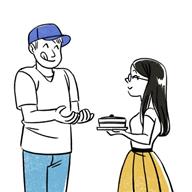Chapter 4: Wanting and Not Wanting
In this chapter we’ll cover how to express our wants, as well as what we don’t want. We’ll also learn how to ask for things politely with "please," and a few essential Korean particles.
Conversation

김철수: 저는 아르바이트를 원합니다.
김영희: 저도 아르바이트를 원합니다.
김철수: 하지만 일을 원하지 않습니다. 돈만 원합니다.
김영희: 저도 일하고 싶지 않습니다. 게임을 하고 싶습니다.
김철수: 저도 게임을 하고 싶습니다. 하지만 돈도 벌고 싶습니다.
"Want" and "Want to"
Korean has two ways to say "want" – which one you use will depend on whether you’re using a verb or a noun.
저는 핸드폰을 원합니다.
"I want a cell phone."
저는 핸드폰을 받고 싶습니다.
"I want to get a cell phone."
The difference between the two above sentences is the first one uses only a noun – "cell phone." The second sentence uses a verb – "to get."
Let’s go over both of these:
"Want" – Noun + (을/를) 원합니다.
"Don’t want" – Noun + (을/를) 원하지 않습니다.
When you want to express that you want something, take the noun and attach the Object Marker. Then add 원합니다.
저는 음식을 원합니다.
"I want food."
저는 연필을 원합니다.
"I want a pencil."
The opposite can be expressed by using 원하지 않습니다 instead.
저는 야채를 원하지 않습니다.
"I don’t want vegetables."
저는 돈을 원하지 않습니다. 사랑을 원합니다.
"I don’t want money. I want love."
"Want to" – Verb Stem + 고 싶습니다.
"Don’t want to" – Verb Stem + 고 싶지 않습니다.
When you want to express that you want to do an action, take the verb stem and attach 고. Then add 싶습니다.
What is the Verb Stem?
Getting the verb stem of a verb is simple. Just take a verb and remove the 다 at the end, and that’s it! You’re going to see verb stems used everywhere in Korean grammar.
하다
→ 하
벌다
→ 벌
먹다
→ 먹
저는 과일을 먹고 싶습니다.
"I want to eat fruits."
저는 돈을 벌고 싶습니다.
"I want to earn money."
The opposite would be made by using 고 싶지 않습니다.
저는 야채를 먹고 싶지 않습니다.
"I don’t want to eat vegetables."
저는 죽고 싶지 않습니다.
"I don’t want to die."
저는 웃고 싶지 않습니다.
"I don’t want to laugh."
Note that the verb 웃다 can mean both "to smile" or "to laugh." Which one it translates to depends on the context of the sentence. If either seem to fit, feel free to translate it as either.
저는 웃고 싶지 않습니다.
"I don’t want to smile."
Advanced Notes:
However! This form (verb stem + 고 싶습니다) can only be used for "I" or "you," and it cannot be used to mean "he" or "she" – it cannot be used to mean "he/she wants to." This is because in Korean, you cannot talk about the desires of another person directly.
Although you can say "I want to go" or "you want to go," in Korean it is not acceptable to say "he wants to go" or "she wants to go" with this same form. You can use this form only when talking about yourself or someone else who you are directly speaking to.
Remember that if you’re expressing that you want to do something, use 고 싶습니다, and if you’re expressing that you want something, use 원합니다.
"Please give me…"
Noun + (을/를) 주세요

In order to ask for something politely, say what you want followed by the Object Marker, and then add 주세요.
돈을 주세요.
"Please give me money."
힌트를 주세요.
"Please give me a hint."
책을 주세요.
"Please give me a book."
Culture Notes:
Approximately 5% of all Korean vocabulary comes from foreign words, most of those from the English language. This includes words such as 힌트, and 오렌지.
Words such as these are sometimes referred to as Konglish – a combination of Korean and English. So if you hear a word in Korean that sounds a lot like an English word, chances are it originally was.
Now that we’ve learned some important grammar, let’s read over the conversation.
김철수: 저는 아르바이트를 원합니다.
"I want a part time job."
The word "아르바이트" comes from the German word "Arbeit" (which means "job"). In slang, this word is commonly shortened to 알바.
김영희: 저도 아르바이트를 원합니다.
"I want a part time job too."
Here in the conversation we have the word 저, meaning "I" or "me," followed by도. Together, 저도 means "I also" or "me too."
The Particle 도
Notice how 도 is taking the place of 는 in the above sentence. Saying 저는도 would be incorrect. When using the particle 도, it replaces whatever particle was there previously (if there was one).
도 is placed directly after a word. The meaning of 도 is "also," "even," or "too."
저도 김치를 좋아합니다.
"I also like kimchi." (Other people also might like kimchi)
저는 김치도 좋아합니다.
"I like kimchi too." (I might also like other things)
Notice how the meaning changes by placing the 도 in a different location. 도 emphasizes "also," "even," or "too" only for the noun or pronoun that it directly follows.
저도 자동차를 원합니다.
"I also want a car." (Other people also might want a car)
저는 자동차도 원합니다.
"I want a car too." (I might also want other things)
Because the 도 in this sentence is placed after "car," it means "I want a car, in addition to whatever else I may want," and not "I also want a car, just like you do."
The word car can be shortened simply to 차, but know that 차 can also mean "tea." Only shorten 자동차 to 차 when the meaning is clear from the context.
Let’s continue with the conversation.
김철수: 하지만 일을 원하지 않습니다. 돈만 원합니다.
"But I don’t want work. I only want money."
하지만 means "but" or "however," and can only be used at the beginning of a sentence.
The Particle 만
만 works grammatically similar to 도, in that it comes after a noun. It replaces whatever particle was previously there (if there was one), except for the Object Marker, which you may replace if you want.
저만 좋아합니다.
"Only I like it."
저는 참치만 원합니다.
"I only want tuna."
Here, without 만, the sentence would be 저는 참치를 원합니다. Because it would normally use an Object Marker, you could have also written the above sentence like this:
저는 참치만을 원합니다.
"I only want tuna."
To keep things simple, feel free to remove whatever particle was previously there every time, and you’ll be just fine.
김영희: 저도 일하고 싶지 않습니다. 게임을 하고 싶습니다.
"I also don’t want to work. I want to play games."
김철수: 저도 게임을 하고 싶습니다. 하지만 돈도 벌고 싶습니다.
"I also want to play games. But I want to earn money too."
Practice
Translate to English:
1. 저는 토마토도 먹고 싶습니다.
2. 저는 토마토만 먹고 싶습니다.
3. 저도 돈을 벌고 싶습니다.
4. 저만 돈을 벌고 싶습니다.
Translate to Korean:
5. "Only I like kimchi."
6. "I like only kimchi."
7. "I also want to eat vegetables."
8. "I want to eat vegetables also."
New Phrases
원합니다. - "I want…"
원하지 않습니다. - "I don’t want…"
Verb Stem + 고 싶습니다. - "I want to…"
Verb Stem + 고 싶지 않습니다. - "I don’t want to…"
주세요. - "Please give me…"
New Vocabulary
하다 - "to do"
먹다 - "to eat"
죽다 - "to die"
태어나다 - "to be born"
받다 - "to get," "to receive"
벌다 - "to earn (money)"
울다 - "to cry"
웃다 - "to smile," "to laugh"
게임(을) 하다 - "to play games"
게임 - "game"
하지만 - "but," "however"
아르바이트 (or 알바) - "part time job"
돈 - "money"
일 - "work," "job"
일(을) 하다 - "to work"
연필 - "pencil"
(자동)차 - "car"
배 - "boat"
핸드폰 - "cell phone" (literally, "hand phone")
사랑 - "love"
야채 - "vegetables"
과일 - "fruit"
바나나 - "banana"
포도 - "grape"
토마토 - "tomato"
레몬 - "lemon"
오렌지 - "orange"
아이스크림 - "ice cream"
차 - "tea"
참치 - "tuna"
힌트 - "a hint"
도 - "also," "even," "too" (particle)
만 - "only" (particle)